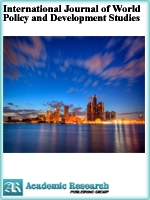International Journal of World Policy and Development Studies
Online ISSN: 2415-2331
Print ISSN: 2415-5241
Print ISSN: 2415-5241
Quarterly Published (4 Issues Per Year)

Archives
Volume 6 Number 6 August 2020
Stakeholders’ Perspective of Role of Policy and Legislation in Achieving Medicines’ Security
Authors: Obi Peter Adigwe
Pages: 66-73
DOI: doi.org/10.32861/ijwpds.66.66.73
Abstract
Background: The role of the pharmaceutical industry in a country such as Nigeria in the provision of safe, high quality and efficacious pharmaceutical products to meet the healthcare need of the populace, cannot be over-emphasized. This study was undertaken to critically look at the issues affecting Medicines’ Security in Nigeria. Methods: A self-completion questionnaire was used for data collection. The questionnaire was administered to participants of an Industry event in September 2017. Data collected were analyzed using Statistical Package for Social Science. Results: A total number of 800 questionnaires were administered to the participants and 529 of the questionnaires were included for analysis. Male participants (58.6%) were more than female participants, all age groups were well represented and more than a third of the respondents had first degree as their minimum qualification. Majority of the respondents (91.3%) indicated that Ministry of Health and its agencies were key to protecting the pharmaceutical sector, while slightly less of that proportion (79.1%) indicated that they patronized Nigeria pharmaceutical products. Almost all the participants (91.7%) supported the need for the local pharmaceutical industry to have access to sustainable funding and other incentives. A similar proportion (89.6%) of the respondents indicated that the local pharmaceutical industry should be prioritized in policy making and implementation. A significant proportion of the study participants (82.3%) indicated that access to medicines in Nigeria is a security issue. Conclusion: To ensure Medicines’ Security and attain medicines self-sufficiency in Nigeria, radical policies must therefore be put in place, together with enabling good business and industrial environment by the government in order to protect, promote and grow the local pharmaceutical industry in Nigeria.
Agricultural Informatics as a Branch of Study in Information Sciences and Technology Domain-A Proposal towards Digital Agriculture
Authors: P. K. Paul ; R. R. Sinha ; Pappachan Baby ; K. S. Shivraj ; Bashiru Aremu ; S. Mewada
Pages: 56-65
DOI: doi.org/10.32861/ijwpds.66.56.65
Abstract
Agricultural Informatics is a valuable domain in the field of interdisciplinary sciences. This is responsible for the applications of Information Technology, Computing and similar technologies into the agricultural activities. This is the combination of Agricultural Science and Information Sciences. The field due to technological nature is much closed with the Agricultural Engineering or Agricultural Technology. There are many allied and similar nomenclature of the fields but all of these are primarily responsible for the same purpose. The field is rapidly increasing in recent past and most practiced in the developed nation. However, in developing countries as well Agricultural Informatics becomes an emerging field of practice and growing rapidly. Agricultural Informatics is growing both in pre and post agricultural activity. This branch is considered as branch of Information Sciences & Technology due to its technological applications in the field of agriculture and allied areas. Information Sciences are the broadest field within the allied branches and growing rapidly. Agricultural Informatics educational programs have started in recent past in different level and stream of education viz. science and technology. However within the broad periphery of Information Sciences it could be offered in other streams and under the wide variety of Information Sciences. This paper is broad and interdisciplinary in nature and deals with the aspects of the Information Sciences and Technology including features, nature, scope and also the potentialities in respect of Agricultural Informatics.
Problems and Prospects of Subsistence Agriculture among Peasant Farmers in Rural Area
Authors: Abdulraheem Mukhtar Iderawumi
Pages: 51-55
DOI: doi.org/10.32861/ijwpds.66.51.55
Abstract
Agriculture has been the major source of livelihood in Nigeria, primarily because the environment is favorable for Agricultural practice. On the basis of climate, topography and vegetation the country is divided into five agricultural zones, namely Dry sub humid, Sub-humid, very humid and swamp/flood. Subsistence agriculture formed the major system of farming in the olden days which provide food crops for human consumption, while surplus are transported to the local markets for sale. Subsistence agriculture also forms the basis upon which all other system of farming are built. Hence, this paper examines the problems and prospects of subsistence agriculture in Ibarapa East local Government Area of Oyo State. Ten farming centres were used as samples in the area. Questionnaires were used to collect relevant data. Percentage and T-test distribution techniques were used to analyze the data. The findings show that there is low agricultural production in the study area as a result of problems such as shortage of fund, land tenure system, inadequate transportation system among others.


